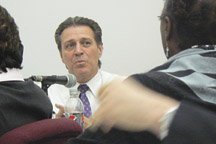How do retired municipal employees come back on the job after getting compensated well for retiring?
The City Council answered that question at a special meeting on Wednesday when they approved two resolutions by a 7-0 vote (with two abstentions) that called for “shared services” agreements between City Hall, and the Municipal Utilities Authority (MUA) and the Jersey City Free Public Library.
Those five-year agreements call for those entities to “utilize each other’s employees to perform certain services” as determined by the city’s business administrator, the directors of the public library, and the MUA.
In the agreements, no names are mentioned. But city spokesperson Jennifer Morrill confirmed before the meeting that the agreements apply to Roger Grego, who worked for the city for over 30 years, and Kathleen Dealy, who had over 25 years experience, until both retired on Feb. 1. Under the agreements, Grego will now work for the Public Library and Dealy will work for the MUA, and both will be paid a salary by those respective agencies.
“Every single dollar you pay in that tax bill that we voted for goes to those two people.” – Steven Fulop
________
They both retired before pending state legislation would have capped payouts for unused sick leave at $15,000 for retiring public employees. Instead, Grego was to be paid $238,138 by the city for 127 vacation days, 356 sick days, and six personal days. Dealy was scheduled to receive $133,447 for 60 vacation days, 269 sick days, and six personal days.
They can still earn those amounts and now come back to new jobs.
City Business Administrator Brian O’Reilly gave the reasons for both being hired back in a Feb. 9 memo to the council asking them to approve the agreements.
O’Reilly said the Public Library and MUA wanted to retain the services of Dealy and Grego, even though it would only be until the end of the fiscal year, which is June 30.
He also noted the pending state legislation capping payouts is a factor in public employees like Grego and Dealy retiring, and taking with them “skill sets which are difficult to replace in the short run.”
O’Reilly also mentioned the pair’s expertise in the city’s business matters, with Grego’s specialty being labor negotiations and Dealy with the city’s budget.
City Hall sources who preferred to remain anonymous said the real reason both were brought back was because of the city’s current problems with the budget. These sources questioned rehiring the pair when the city is in a fiscal crisis with furloughs and layoffs happening to city employees. (See cover story.)
While seven of the nine council members voted in favor of the resolutions, council members Steven Fulop and Viola Richardson abstained. They said later that while they respect Grego and Dealy, other city employees could have stepped in and fill the void.
Not everyone’s on board
The City Council also voted 8-1 to appoint two people to the Jersey City Incinerator Authority board.
Councilman Steven Fulop was the lone vote against the appointment of both Roger Hejazi and Frank Cecchia due to the issue of health benefits. He has sponsored several ordinances that would strip health benefits of board members for the Incinerator Authority (JCIA) and the MUA as well as the City Council, in order to save the city money.
Those ordinances will be on the agenda at this Wednesday’s council meeting.
Board members for the JCIA and the MUA are not paid, but receive health benefits that Fulop estimates to be $400,000 for the two boards combined. Each board has seven members.
Fulop’s initiative to cut health benefits is based on the fact that both boards have part-time members that meet at a minimum for 12 hours per year, or one hour per monthly meeting.
At Wednesday’s meeting Fulop wanted to know if Hejazi was willing to serve on the JCIA board even if Fulop’s health benefits ordinance was passed.
When Fulop was informed by Richardson that Hejazi told her he would serve without benefits, Fulop then wanted the resolution for Hejazi’s appointment to be revised to indicate that Hejazi would serve without benefits.
Fulop’s request provoked opposition from several council members.
Michael Sottolano wanted the appointment of Hejazi to go through, saying the council could revisit Hejazi’s appointment in the future to remove his health benefits when Fulop’s ordinance has been passed.
Councilman Bill Gaughan took exception to Fulop’s comments about JCIA and MUA board members serving for a few hours, saying, “You make this stuff up.” Gaughan’s daughter, Eileen, is the chairperson of the MUA board.
When it came time to vote, Fulop took one last stand against the appointments by reminding the small audience at the meeting about the city’s recent 25 percent tax hike, the result of the city’s $195 million tax levy in the $507 million municipal budget introduced by the council last month.
“Every single dollar you pay in that tax bill that we voted for goes to those two people,” Fulop said.
Ricardo Kaulessar can be reached at rkaulessar@hudsonreporter.com.
